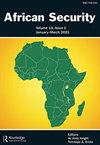Vaccine nationalism, violent extremist problematique and state management of combat-related deaths
IF 1.3
Q2 POLITICAL SCIENCE
引用次数: 0
Abstract
The COVID-19 pandemic has revealed in stark terms the perpetuation of global apartheid and the persistence of the yawning gap between developed and developing countries. Mzukisi Qobo, Matlala Setlhalogile, and Mills Soko, the authors of the first article in this issue of African Security, “The Political Economy of Global Vaccine Nationalism: Towards Building Agency for Africa’s Drug Manufacturing Capacity,” critique the morally repugnant predatory behavior of pharmaceutical firms in the global north that take advantage of the health insecurity crisis to increase the prices of much needed vaccines for people in the global south. In doing so, the authors also point, at least implicitly to the structural racism that underpins the movements by countries in the global north toward vaccine nationalism. They suggest a pragmatic prescription: African countries, representing the marginalized segments of the globe, should engage in scientific collaboration to build local capacity for manufacturing vaccines, develop human capital and nurture value chains to be able to counter the health insecurity that ultimately follows from global pandemics. However, addressing this health security concern will require collaboration between rich and poor countries. Rich countries must be willing to work with the WTO on an agreement to introduce intellectual property waivers that would allow poor countries to manufacture successful vaccines. At the same time, poor countries need to focus on practical ways of encouraging technology transfers to, and skills upgrades of, their populations. This outstanding piece has both scholarly and policy implications. The second article, “Comparative Perspectives on Linkages between Violent Extremism and Organized Crime in Africa,” by Anouar Boukhars and Catherine Lena Kelly, makes an excellent contribution to understanding another element of insecurity on the African continent, viz., the nexus between violent extremism and organized crime. Conceptually, Boukhars and Kelly draw on the recent literature on concatenated violence to situate the coexistence-cooperation-convergence spectrum of these two challenges and threats to security in Africa (the terror-crime dynamic). This article not only makes a useful contribution to the African security literature, it also raises a number of significant issues that ought to be taken up by scholars who want to understand the complex nature of criminal networks and sustenance of terror organizations. The authors argue that this complex crime-terror nexus is one of the defining features of contemporary African security. This is supported by the authors’ empirical examination of the cases of Sahel-Sahara, Lake Chad Basin, and the Horn of Africa. How African AFRICAN SECURITY 2022, VOL. 15, NO. 1, 1–3 https://doi.org/10.1080/19392206.2022.2059923疫苗民族主义、暴力极端主义问题和国家对与战斗有关的死亡的管理
新冠肺炎疫情鲜明地揭示了全球种族隔离的长期存在以及发达国家与发展中国家之间巨大差距的持续存在。Mzukisi Qobo、Matlala Setlhalogile和Mills Soko是本期《非洲安全》第一篇文章的作者,《全球疫苗民族主义的政治经济学:建立非洲药品生产能力机构》批评了全球北方制药公司利用健康不安全危机提高全球南方人民急需的疫苗价格的道德败坏的掠夺行为。在这样做的过程中,作者还指出,至少隐含地指出,结构性种族主义是全球北方国家走向疫苗民族主义运动的基础。他们提出了一个务实的处方:代表全球边缘化群体的非洲国家应该参与科学合作,建设当地生产疫苗的能力,发展人力资本,培育价值链,以应对全球流行病最终带来的健康不安全。然而,解决这一健康安全问题需要富国和穷国之间的合作。富裕国家必须愿意与世贸组织合作,达成一项协议,引入知识产权豁免,使贫穷国家能够生产成功的疫苗。与此同时,贫穷国家需要注重鼓励向其人口转让技术和提高其技能的切实可行的方法。这篇杰出的文章具有学术和政策意义。Anouar Boukhars和Catherine Lena Kelly撰写的第二篇文章《非洲暴力极端主义与有组织犯罪之间联系的比较视角》为理解非洲大陆不安全的另一个因素,即暴力极端主义与组织犯罪之间的联系做出了卓越贡献。从概念上讲,Boukhars和Kelly借鉴了最近关于连锁暴力的文献,来定位这两个挑战和对非洲安全的威胁(恐怖犯罪动态)的共存合作趋同范围。这篇文章不仅对非洲安全文献做出了有益的贡献,还提出了一些重要问题,希望了解犯罪网络和恐怖组织生存的复杂性质的学者应该讨论这些问题。作者认为,这种复杂的犯罪与恐怖关系是当代非洲安全的决定性特征之一。这得到了作者对萨赫勒-撒哈拉、乍得湖盆地和非洲之角案例的实证研究的支持。《2022年非洲安全如何》,第15卷,第1、1–3期https://doi.org/10.1080/19392206.2022.2059923
本文章由计算机程序翻译,如有差异,请以英文原文为准。
求助全文
约1分钟内获得全文
求助全文

 求助内容:
求助内容: 应助结果提醒方式:
应助结果提醒方式:


